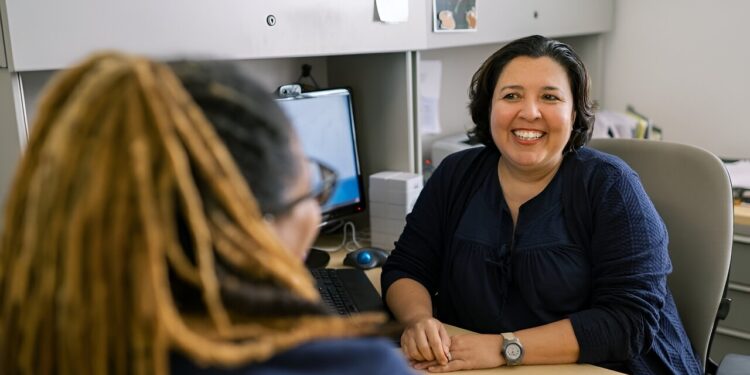Dr. Vanessa Diaz (right) speaks with a member of the family medicine health care team. Credit: Zheng Chia
Historically, South Carolina has experienced some of the highest rates of intimate partner violence, or IPV, in the United States. IPV includes any physical or sexual violence, stalking, and psychological assault by a current or former partner or spouse.
“There is an epidemic of domestic violence in South Carolina,” said Dr. Leslie A. Lenert, associate vice provost for data sciences and computing and director of the Center for Biomedical Informatics at MUSC.
To combat this epidemic, Lenert teamed up with clinical psychologist Alyssa A. Rheingold, PhD, family physician Vanessa Diaz, MD, and health services researcher Kit N. Simpson, DrPH, to develop an electronic medical record (EMR)-based domestic violence screening. They report in Opening of the JAMA network that this EHR-based screening, which prioritized confidentiality, was 10 times more effective than traditional oral screening.
Screening for intimate partner violence in primary care is recommended by the U.S. Preventive Services Task Force because it can help identify individuals at risk. However, intimate partner violence screening is often underutilized due to busy clinical schedules, and when used, it is performed orally. These oral screens lack confidentiality, which can make victims uncomfortable reporting.
There is an urgent need to improve screening, as domestic violence can have lasting effects on victims and their families.
“Victims of violent relationships are at risk for long-term psychological difficulties, such as post-traumatic stress disorder, and children who witness domestic violence also face challenges,” said Rheingold, a professor in MUSC’s department of psychiatry and behavioral sciences.
Although both men and women can experience intimate partner violence, the prevalence is higher among women and they are more likely to be seriously injured or killed. That’s why the team worked with advisory committees to adapt a physical and sexual violence screening tool and administered it electronically exclusively to women.
“We consulted with a national expert advisory committee, as well as an advisory committee of victims and survivors of domestic violence, to get their input on which screening tools would be most effective,” Rheingold said.
After confirming the best approach, they launched their screening tool in primary care centers across South Carolina.
As a family physician, Diaz, chief of MUSC’s Integrated Primary Care Clinical Excellence Center, has had first-hand experience with the need and challenge of integrating IPV screening.
“It was important to provide patients with a safe space through technology where they felt comfortable answering these very personal and emotional questions,” she said. “At the same time, screening needed to be streamlined into existing workflows because, unfortunately, providers have a lot of competing demands.”
Instead of asking patients verbally if they had experienced domestic violence, physicians or primary care providers gave patients a computer containing a confidential questionnaire without their partner present. This reduced the risk that patients would feel judged by staff members or intimidated by their partner. Visit notes about domestic violence and physician-patient communications were also stored in a confidential area of the EHR, which the patient and provider could access but not the spouse or partner.
Additionally, health care providers were provided with best practices for discussing domestic violence with patients, as well as referral resources where women could seek additional help.
Ultimately, the MUSC team’s EHR screening was 10 times more effective than traditional oral screening. Not only did the screening make it easier to identify women experiencing domestic violence, it also helped normalize screening for domestic violence.
“I was pleasantly surprised to find that our staff and patients were grateful that we asked about domestic violence, even if it didn’t concern them, because they know it’s a major problem and that screening is an important first step in getting people the help they need,” Diaz said.
To help women take that first step, this team is working to close the gap in patient reporting.
“Our goal is to make the medical office a safe place where women can discuss domestic violence with their health care provider and move forward with the difficult task of escaping an abusive relationship,” Lenert said.
The researchers are aware that their EHR screening is not a silver bullet to combat domestic violence. They stress the importance of empowering victims to seek help.
“We recognize that most situations are complex and we want people experiencing domestic violence to know that there is support available to help them feel safe and get to a safe place,” Rheingold said.
The National Domestic Violence Hotline is available 24 hours a day, 7 days a week at 1-800-799-7233.
More information:
Lenert, L. et al. Electronic medical record-based screening for intimate partner violence: a cluster randomized clinical trial. Opening of the JAMA network (2024). DOI: 10.1001/jamanetworkopen.2024.25070CDC. jamanetwork.com/journals/jaman … /fullarticle/2821812
Provided by the Medical University of South Carolina
Quote: Domestic violence: preserving patient privacy can save lives (2024, September 17) retrieved September 17, 2024 from
This document is subject to copyright. Apart from any fair dealing for the purpose of private study or research, no part may be reproduced without written permission. The content is provided for informational purposes only.



